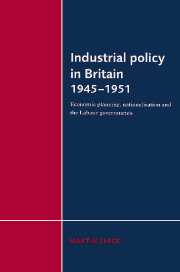 Industrial Policy in Britain 1945–1951
Industrial Policy in Britain 1945–1951 2 - New Jerusalem?
Published online by Cambridge University Press: 14 January 2010
Summary
The establishment of the CEPS and the IPC put in place a central administrative machinery charged with reviewing the plans of departments and matching them with the resources likely to be available. Conceived amidst a rising concern with excess demand, these new instruments of planning would almost inevitably be perceived as miserable rejecters, trimmers, and cutters of departmental programmes. In each biennial year of crisis, 1947, 1949, 1951, the rhetoric of cuts was predominant. At the time, industrialists complained that the needs of industrial investment were particularly badly hit in this process and almost ever since there have been general accusations that the ‘New Jerusalem’ policies of the Attlee governments involved excessive expenditure on welfare, health, and housing programmes at the expense of industrial investment and modernisation, and the development of such programmes as technical education. In short, it is argued that the Attlee governments got their priorities wrong. The predominant concern of the CEPS and the IPC was with this very issue of priorities. Just how should resources be distributed between the competing needs of consumption, exports, investment, defence, and the “New Jerusalem” programmes? The CEPS and the IPC were established to produce recommendations on just these issues, and their proposals would then be considered by Cabinet and final decisions made. The planning structure required priorities to be articulated, and thus provides a basis on which to test the claims that the Attlee governments were insufficiently mindful of the needs of industrial investment and thereby pawned the relative economic growth of Britain for the sake of excessive social-welfare programmes.
- Type
- Chapter
- Information
- Industrial Policy in Britain 1945–1951Economic Planning, Nationalisation and the Labour Governments, pp. 16 - 40Publisher: Cambridge University PressPrint publication year: 1997


